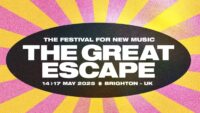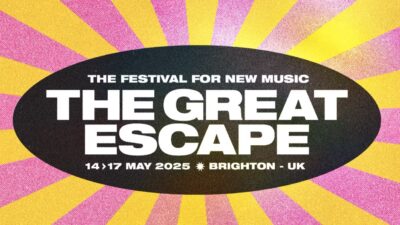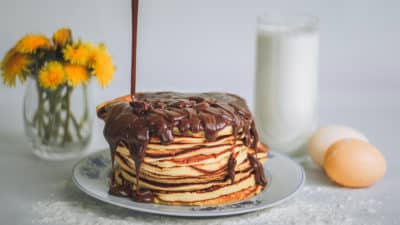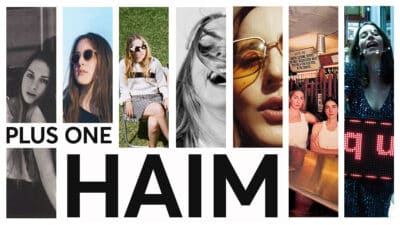Music
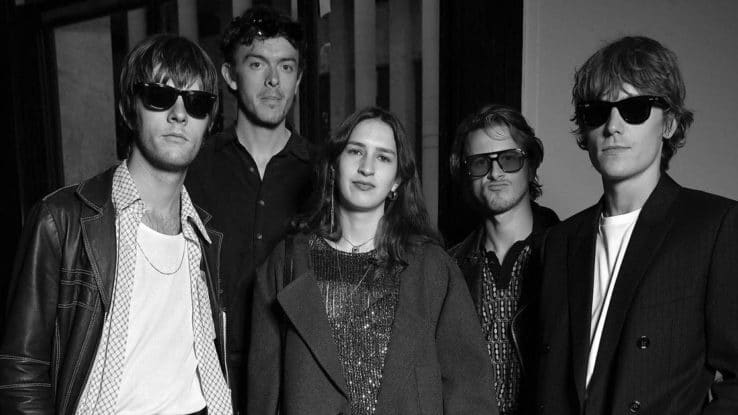
Interview
Up Next: DEADLETTER
Meet the South London music collective exploring new ways to write post-punk
Formed in the quiet of small-town Yorkshire, DEADLETTER’s first challenge was getting somewhere where the post-punk scene seemed a little more active. Barely had the band reconvened and relaunched in London when they were introduced to their second challenge, in the form of March 2020. Despite this, the last two years have seen them release a string of successful singles, garnering attention from major music publications.
This summer, the group will take part in the Revive Live tour, visiting a local venues across the UK from Manchester to Brighton. We caught up with them ahead of these shows to discuss how it’s all going, where things are headed, and why they’re one to watch.
The Revive Live tour is all about supporting local grassroots venues. What does that mean to you?
I suppose it’s pretty inevitable that grassroots venues are where you’ve got to start out as a musician in the industry. And if there weren’t any grassroots venues, and it was all arenas and bigger capacity venues, there wouldn’t be a stepping stone for musicians to get to the next level and take the music and songs to a wider audience.
It’s great to see a lot of acts getting behind this because it’s obviously for a great cause. And it’s so important. Without grassroots venues, upcoming bands and musicians would really struggle. So it’s so important to get out and support these places. We’re very happy to do this tour for that exact reason.
Where did DEADLETTER begin?
It was formed initially by the three of us, myself (Zac), the bass player (George) and the drummer (Alfie). We all lived in small towns in northeast Yorkshire. We were about 16, when we first started, and we were not called DEADLETTER at the time. It was the first band that we got together where we were writing our own music. And I suppose just taking ourselves maybe a little bit more seriously. I mean, in hindsight, compared to what we are now, it definitely wasn’t taking ourselves seriously. But more than just being in cover bands and playing pub circuits – going out with a bit more punch, swapping the acoustic instruments for electric instruments. And that’s sort of where it all began, going from a band who used to go busking on the streets of local towns to being a band who try to play actual venues to crowds of people. As opposed to you know, having hen parties wandering past on a Saturday morning.
Then we moved down to London together to hopefully pursue a career in music. Because in the towns that we were from there just wasn’t much prospect of us going anywhere. Me and George are from small market towns and Alfie’s from a little fishing village called Robin Hood’s Bay. Within those three places, respectively, there’s not particularly a music scene. We kind of latched on to the one that was going on in York, which was our closest city. But it just didn’t look like there was much prospect to take it to the next level without going to a bigger city. So we chose London.
The band, as it is now, has actually only existed since February 2020. We sort of rebranded – we realised that if we wanted to take things more seriously we needed to change our name and introduce some new members and eventually became a six piece. That’s where we’re at now.
Not that you would have known at the time, but February 2020 must have been an interesting time to relaunch.
It was. We had just recorded a single for the relaunch, and then the pandemic hit. It was one of the most frustrating times to have had this rebrand. You’re looking side to side like, “Oh, right. Well, when in Christ’s name are we going to play a show? When are we even going to be able to be together to write?” We’ve gone through quite a few member changes even since then. But the line-up that we have at the moment is the solid one.
Now you’re working on a debut album. What’s that process been like?
It’s been good. Just last weekend we started the writing sessions for the album. Hopefully we’ll start getting the proper ideas together for that before the end of this year, and next year will be debut album territory. I think we’re ready for it. It’s about time that we stopped just releasing single after single!
How would you describe your sound to a new listener?
Oh my god, it’s so hard to come up with these things without sounding pretentious. It’s danceable, and it’s angular, and it’s jittery. We want people to know we’re not just a post punk band who write loud rowdy music. We can go at it from a more rhythmic, stripped back approach. One thing that is important about the way we write music is we write around the bass and the drums as opposed to starting with a guitar line and adding everything to that, which I think is definitely key to our sound. If you’ve listened to any of our tracks, it’s the bass leading it for the majority of the time.
That feels like quite an unusual way to write.
Yeah, I think it is. I’ve thought about it in the past and tried to work out how that came about. We were a three piece for quite a few years – at the time, I was playing guitar, and I wasn’t just the lead vocalist. I think, to give myself more space to sing and to get my words across, because all our music is quite wordy, I would not play the guitar as much in the verses and leave it up to the bass to be leading the song. Even when we added more members, that formula had already worked. If something’s not broken, you don’t fix it, you know?
What kind of music did you listen to growing up?
Growing up I listened to a lot of David Bowie because my mom did. The same with Prince actually. I remember the Stranglers being on a lot as well, and I used to listen to a lot of The Pogues. So quite a mix of new wavy funky folk.
Would you say that your music taste has changed much since then?
No, I wouldn’t say so. I think I try to keep my listening habits as eclectic as possible. I don’t like personally like to compartmentalise like, “I like this genre, and that’s it.” I would say that I have much more of an attraction to music where the words tell a story as opposed to just sounding good. I can’t say I listen to much dance music. That’s not out of hatred for dance music, but more so out of love for words and storytelling.
What was DEADLETTER’s first ever gig like?
Our first gig was actually a seated one at The George Tavern in London. We’d spent a week in the summer up at the drummer’s house, which is this beautiful little house in the middle of nowhere in Yorkshire. We spent a week in his barn getting together a set – because we spend so much time apart, we didn’t actually have a set as DEADLETTER. And then we managed to take that to a venue in London. People sat in front of us while we performed, which was pretty bizarre.
The first one post busking days (before DEADLETTER) was in 2016, in a pub in the village that Alfie is from. It was interesting. I think it was just our mates there. I do remember the bartender telling me that he thought I was the first person to perform there who took their shirt off. It wasn’t even a statement. It was just really hot.
If DEADLETTER had never happened, what do you think you’d be doing now?
It’s funny you should say that because I’m actually at work right now. I’m currently sanding down the walls in someone’s flat. So perhaps I would be a painter-decorator. At the same time, I always had an interest in film when I was younger. So you never know, maybe I would have branched into that. Tried to be an actor. Who knows? It’s really hard to tell these things. You kind of take away your safety net when you realize what you want to do for a living… I’m talking about the band, not the painter-decorating…
Catch DEADLETTER on the Revive Live tour this August and September. Find tickets here.




